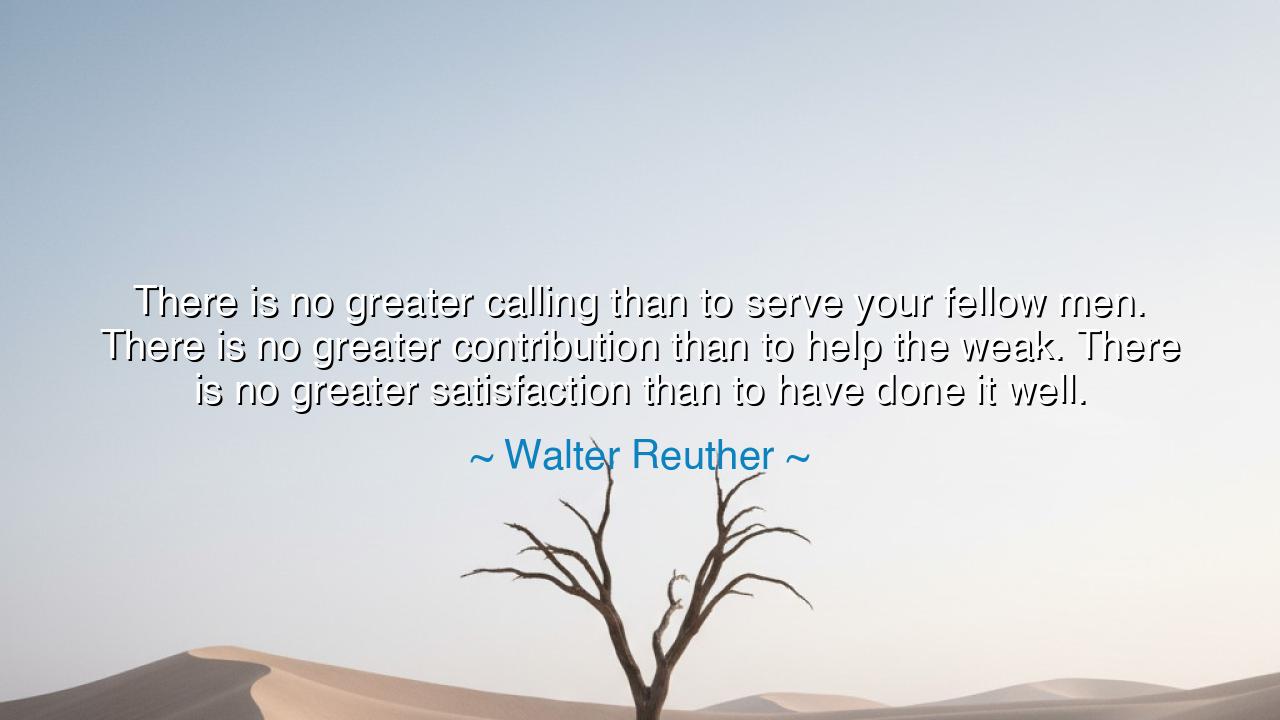
There is no greater calling than to serve your fellow men. There
There is no greater calling than to serve your fellow men. There is no greater contribution than to help the weak. There is no greater satisfaction than to have done it well.






"There is no greater calling than to serve your fellow men. There is no greater contribution than to help the weak. There is no greater satisfaction than to have done it well." — these are the words of Walter Reuther, a man whose life was devoted to the noble pursuit of justice and equality. He understood, as the great sages of old did, that the highest purpose of any human is not to seek fame or wealth, but to serve those around them, to uplift the weak, and to bring about the kind of goodness that transforms the world. For in the service of others, we find the true measure of our worth, and in helping the vulnerable, we write the story of our most noble deeds.
From the dawn of time, there have been those who, driven by a higher sense of purpose, have chosen to give of themselves for the sake of others. These are the true heroes—not the ones who seek glory, but the ones who silently labor in the shadows, ensuring that the weak have a chance to rise, that the suffering have a balm for their wounds. The ancient warrior who lays down his sword to protect the helpless is just as revered as the sage who imparts wisdom to a troubled soul. The true calling of a human being is not to seek domination, but to humbly serve the greater good.
In the life of Gandhi, we see this calling realized. Though born to privilege, he chose to serve the oppressed of India, leading them with nonviolent resistance against the injustice of British colonial rule. He did not seek wealth, nor did he seek power. He sought only to uplift the weak, to show that even in the face of tyranny, the power of love and selfless service could change the course of history. Gandhi’s life is a testament to Reuther’s words, for in his work, he found his purpose, and in his service to others, he found his satisfaction—a satisfaction that came not from personal gain, but from the knowledge that he had acted in alignment with the highest calling of all.
Reuther’s wisdom echoes the words of many ancient philosophers who spoke of the value of service. Socrates taught that the life of virtue was not one of self-indulgence, but of self-sacrifice—a life given to the service of others. And so it is, that in serving the weak, the vulnerable, we bring our lives into alignment with a deeper truth, one that transcends the material world. It is not the accolades of the crowd that will grant us peace at the end of our days, but the quiet satisfaction that comes from knowing we have made the world a better place for those who walk after us.
Think of the great Florence Nightingale, whose hands touched the lives of countless wounded soldiers and suffering patients. Her calling was not one of comfort, nor of ease. It was one of sacrifice, of giving, and of tending to the weakest among us. She is remembered not for her titles or her wealth, but for the way she lived her life in service to others. In her service, she found the greatest satisfaction—the satisfaction that comes from knowing that her actions made the world a gentler place.
Reuther’s words offer a profound lesson for us all. In a world where so many are consumed by the desire for power and wealth, his message is a call to a higher purpose—to serve not just those who can offer something in return, but to help those who have nothing. The weak, the poor, the oppressed—they are the ones who need our strength, our compassion, our action. It is in serving them that we become the fullest expression of our humanity, for in their suffering, we find our purpose.
Let us ask ourselves, then: What have we done today to serve others? How have we uplifted those who are struggling, those who are vulnerable? The true satisfaction in life does not come from the empty pursuit of riches or accolades, but from the quiet moments when we know we have helped, when we have been the hands that lift others up. Let us take the wisdom of Walter Reuther to heart and seek not only to live for ourselves but to live for others, to serve the weak, to heal the wounded, and to build a world where compassion and service are the highest virtues.
In our daily lives, let us find ways to serve—whether through small acts of kindness or grand gestures of sacrifice. For in that service, we will find our true calling, our greatest contribution, and the deep satisfaction that comes from knowing we have done well in the eyes of both humanity and the divine.






AAdministratorAdministrator
Welcome, honored guests. Please leave a comment, we will respond soon